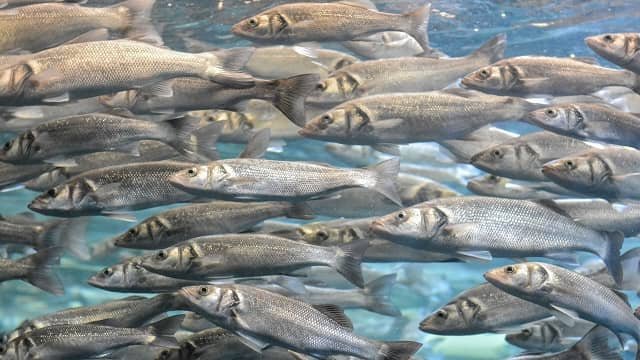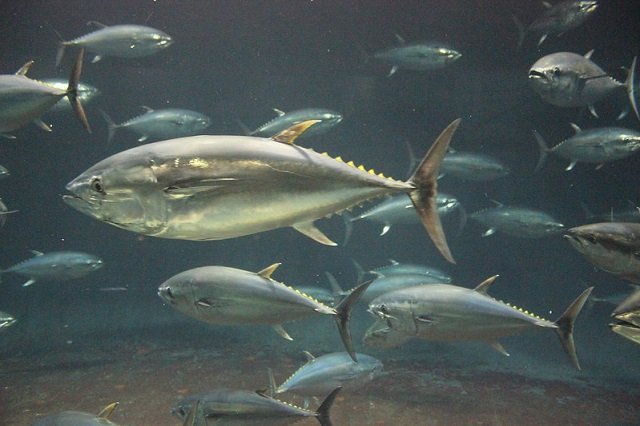
The health of our oceans is closely related to the health of our planet. Climate change, driven by human activity, is causing a domino effect on all marine ecosystems, and the rising sea temperature poses a significant threat. This is especially concerning for the Mediterranean aquaculture industry.
A recent study conducted by marine scientists from the University of Alicante and the Miguel Hernández University of Elche reveals a worrying trend of increasing sea temperature and increasingly frequent heatwaves, posing a significant threat to the well-being of farmed fish such as sea bream and sea bass.
Climate change heats the Mediterranean
The research, conducted using sophisticated oceanographic data analysis, paints a concerning picture. Over the past four decades, key aquaculture areas in the western Mediterranean have experienced a steady and alarming increase in water temperature at all depths. This warming trend is particularly pronounced in some regions, reaching up to 0.75°C per decade.
More frequent and intense heatwaves
The situation is further exacerbated by the growing frequency and duration of marine heatwaves. These events, which can cause a dramatic increase in water temperature, have become three times more frequent compared to the 1980s and last nearly 50% longer on average. The summer of 2022 stands out as a clear example, with temperature anomalies reaching an astonishing 4.2°C and persisting throughout the season.
Fish well-being is threatened
This temperature increase has a direct impact on the health and well-being of farmed fish. Each species has a specific thermal threshold: a temperature range beyond which they experience stress and jeopardize their health. The study reveals a worrying trend: not only are the thermal well-being thresholds of fish increasing, but they are also appearing seasonally several days earlier each decade.
The good news? Scientists are on the case. Researchers leveraged sophisticated oceanographic data to analyze temperature changes over four decades.
Adaptation through immersion: a potential solution
Traditional open-net cage systems used in Mediterranean aquaculture may no longer be sufficient to protect fish from harmful fluctuations in seawater temperature.
Researchers propose a possible solution to mitigate the impact of rising temperatures: submerging cages to cooler depths. Their analysis suggests that for optimal conditions, sea bream cages should be submerged to about 20 meters, while sea bass benefit from depths of approximately 15 meters. Ideally, this immersion should take place around the second week of July, coinciding with the earlier onset of thermal stress.
This approach offers several benefits:
Stay Always Informed
Join our communities to instantly receive the most important news, reports, and analysis from the aquaculture industry.
- Temperature stress reduction: Deeper waters provide a more stable temperature environment, reducing stress on farmed fish.
- Protection against other threats: Submerged cages can also offer protection against storms, harmful algal blooms, and parasite outbreaks.
Challenges and the need for collaboration
However, implementing this solution may not be straightforward, particularly in shallow farming areas. The study underscores the need for a multifaceted approach to address this challenge. Collaboration among researchers, industry professionals, and regulatory bodies is crucial to developing innovative technological solutions, implementing sustainable practices, and establishing effective regulations to ensure the long-term viability of Mediterranean aquaculture in the face of climate change.
Additionally, the effectiveness of the proposed strategy depends on several factors, including:
- Seasonal onset of thermal thresholds: Understanding when these critical temperature levels occur throughout the year is crucial for optimally scheduling immersion strategies.
- Depth of isotherms: Knowing the depth at which water remains sufficiently cool for optimal fish health is essential for determining the feasibility of submerging cages to a sufficient depth.
- Long-term trends: As sea temperatures continue to rise, evaluating these changes over time is vital for adapting immersion strategies for the future.
Conclusion
The future of Mediterranean fish farms depends on our ability to adapt. By understanding the threats posed by climate change and implementing innovative solutions, we can ensure the continued health of these vital food sources and the well-being of the farmed fish themselves.
The research serves as a wake-up call for the Mediterranean aquaculture industry. While farmed fish are currently adapted to existing conditions, their ability to thrive under the rapid pace of environmental change remains uncertain. By embracing innovative solutions and fostering collaborative action, the industry can navigate this critical juncture and ensure the future of sustainable aquaculture in the region.
Contact
Javier Atalah
Department of Marine Science and Applied Biology, University of Alicante, Spain
Email: j.atalah@ua.es
Reference
Atalah, J., Ibañez, S., Aixalà, L., Barber, X., & Sánchez-Jerez, P. (2024). Marine heatwaves in the western Mediterranean: Considerations for coastal aquaculture adaptation. Aquaculture, 588, 740917. https://doi.org/10.1016/j.aquaculture.2024.740917
Editor at the digital magazine AquaHoy. He holds a degree in Aquaculture Biology from the National University of Santa (UNS) and a Master’s degree in Science and Innovation Management from the Polytechnic University of Valencia, with postgraduate diplomas in Business Innovation and Innovation Management. He possesses extensive experience in the aquaculture and fisheries sector, having led the Fisheries Innovation Unit of the National Program for Innovation in Fisheries and Aquaculture (PNIPA). He has served as a senior consultant in technology watch, an innovation project formulator and advisor, and a lecturer at UNS. He is a member of the Peruvian College of Biologists and was recognized by the World Aquaculture Society (WAS) in 2016 for his contribution to aquaculture.







